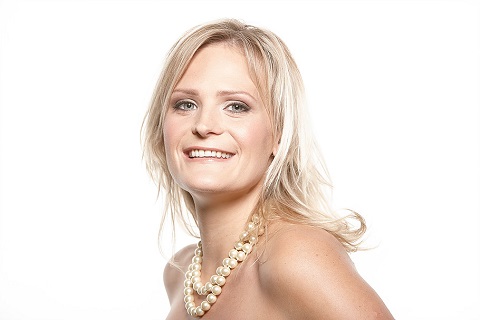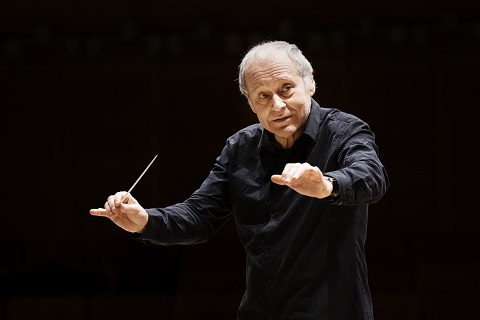
08 Jan 2018
In the Beginning ... Time Unwrapped at Kings Place
Epic, innovative and bold, Haydn’s The Creation epitomises the grandeur and spirit of the eighteenth-century Enlightenment.
English Touring Opera are delighted to announce a season of lyric monodramas to tour nationally from October to December. The season features music for solo singer and piano by Argento, Britten, Tippett and Shostakovich with a bold and inventive approach to making opera during social distancing.
This tenth of ten Live from London concerts was in fact a recorded live performance from California. It was no less enjoyable for that, and it was also uplifting to learn that this wasn’t in fact the ‘last’ LfL event that we will be able to enjoy, courtesy of VOCES8 and their fellow vocal ensembles (more below …).
Ever since Wigmore Hall announced their superb series of autumn concerts, all streamed live and available free of charge, I’d been looking forward to this song recital by Ian Bostridge and Imogen Cooper.
The Sixteen continues its exploration of Henry Purcell’s Welcome Songs for Charles II. As with Robert King’s pioneering Purcell series begun over thirty years ago for Hyperion, Harry Christophers is recording two Welcome Songs per disc.
Although Stile Antico’s programme article for their Live from London recital introduced their selection from the many treasures of the English Renaissance in the context of the theological debates and upheavals of the Tudor and Elizabethan years, their performance was more evocative of private chamber music than of public liturgy.
In February this year, Albanian soprano Ermonela Jaho made a highly lauded debut recital at Wigmore Hall - a concert which both celebrated Opera Rara’s 50th anniversary and honoured the career of the Italian soprano Rosina Storchio (1872-1945), the star of verismo who created the title roles in Leoncavallo’s La bohème and Zazà, Mascagni’s Lodoletta and Puccini’s Madama Butterfly.
Evidently, face masks don’t stifle appreciative “Bravo!”s. And, reducing audience numbers doesn’t lower the volume of such acclamations. For, the audience at Wigmore Hall gave soprano Elizabeth Llewellyn and pianist Simon Lepper a greatly deserved warm reception and hearty response following this lunchtime recital of late-Romantic song.
Collapsology. Or, perhaps we should use the French word ‘Collapsologie’ because this is a transdisciplinary idea pretty much advocated by a series of French theorists - and apparently, mostly French theorists. It in essence focuses on the imminent collapse of modern society and all its layers - a series of escalating crises on a global scale: environmental, economic, geopolitical, governmental; the list is extensive.
For this week’s Live from London vocal recital we moved from the home of VOCES8, St Anne and St Agnes in the City of London, to Kings Place, where The Sixteen - who have been associate artists at the venue for some time - presented a programme of music and words bound together by the theme of ‘reflection’.
'Such is your divine Disposation that both you excellently understand, and royally entertaine the Exercise of Musicke.’
Amongst an avalanche of new Mahler recordings appearing at the moment (Das Lied von der Erde seems to be the most favoured, with three) this 1991 Mahler Second from the 2nd Kassel MahlerFest is one of the more interesting releases.
‘And there was war in heaven: Michael and his angels fought against the dragon; and the dragon fought and his angels, And prevailed not; neither was their place found any more in heaven … that old serpent … Satan, which deceiveth the whole world: he was cast out into the earth, and his angels were cast out with him.’
If there is one myth, it seems believed by some people today, that probably needs shattering it is that post-war recordings or performances of Wagner operas were always of exceptional quality. This 1949 Hamburg Tristan und Isolde is one of those recordings - though quite who is to blame for its many problems takes quite some unearthing.
There was never any doubt that the fifth of the twelve Met Stars Live in Concert broadcasts was going to be a palpably intense and vivid event, as well as a musically stunning and theatrically enervating experience.
‘Love’ was the theme for this Live from London performance by Apollo5. Given the complexity and diversity of that human emotion, and Apollo5’s reputation for versatility and diverse repertoire, ranging from Renaissance choral music to jazz, from contemporary classical works to popular song, it was no surprise that their programme spanned 500 years and several musical styles.
The Academy of St Martin in the Fields have titled their autumn series of eight concerts - which are taking place at 5pm and 7.30pm on two Saturdays each month at their home venue in Trafalgar Square, and being filmed for streaming the following Thursday - ‘re:connect’.
The London Symphony Orchestra opened their Autumn 2020 season with a homage to Oliver Knussen, who died at the age of 66 in July 2018. The programme traced a national musical lineage through the twentieth century, from Britten to Knussen, on to Mark-Anthony Turnage, and entwining the LSO and Rattle too.
With the Live from London digital vocal festival entering the second half of the series, the festival’s host, VOCES8, returned to their home at St Annes and St Agnes in the City of London to present a sequence of ‘Choral Dances’ - vocal music inspired by dance, embracing diverse genres from the Renaissance madrigal to swing jazz.
Just a few unison string wriggles from the opening of Mozart’s overture to Le nozze di Figaro are enough to make any opera-lover perch on the edge of their seat, in excited anticipation of the drama in music to come, so there could be no other curtain-raiser for this Gala Concert at the Royal Opera House, the latest instalment from ‘their House’ to ‘our houses’.
"Before the ending of the day, creator of all things, we pray that, with your accustomed mercy, you may watch over us."

Epic, innovative and bold, Haydn’s The Creation epitomises the grandeur and spirit of the eighteenth-century Enlightenment.
Opening Kings Place’s new Time Unwrapped series - a project which is as bold and inventive as Haydn’s oratorio - Ádám Fischer led the Orchestra and Choir of the Age of Enlightenment, and a trio of young soloists, in a performance which proved that one doesn’t need a whole host, of angels or mortals, to celebrate the wonder and joy of God’s monumental achievement in creating the world.
This was the first time The Creation had been performed in Kings Place’s Hall One, and the small but varied instrumental forces - three flutes nestled beside the fiddles, a rich-red harpsichord dominating the centre, a splendid baroque contra-bassoon which seemed to be stretching upwards to the heavens - and sixteen-strong choir made for an impressive sight, tightly packed on the stage and in the gallery above. The first public performance of the oratorio took place on 19th March 1799 and involved a complement of 180 performers, in imitation of the large-scale performances of Handel’s oratorios that Haydn had admired during his visits to London in early 1790s. But, Fischer - who in 1987 co-founded the Haydn Festival in Eisenstadt - and his musicians turned the smaller dimensions of the venue and their own forces into a virtue. This was an intensely dramatic performance in which carefully delineated, strongly articulated musical details, vibrant colours and a vigorous dynamism created enormous energy, excitement and elation.
Moreover, with the choir aloft framed by trombones to the right and timpani and trumpets to the left, seated in the balcony I frequently felt totally immersed in the vibrant sound that Fischer conjured. There was mystery and delicacy, no more so that in the opening representation of Chaos, but there was also robustness and realism. Fischer seemed to delight in the challenging piquancy of those initial dissonances, while the resolving pronouncement, ‘Let there be Light’, was a glorious wall of blazing sound which seemed to possess veritable physical mass and tangible brightness.
The OAE instrumentalists produced grandeur when required, but played with responsiveness and suppleness. There were moments of sublimity - the grace and profundity of the lower strings’ depiction of the ‘great whales’ - and pastoral grace, as the lyrical exchanges between the flute and clarinet charmed the cattle in the meadows and fields.
 Ádám Fischer. Photo credit: Nikolaj Lund.
Ádám Fischer. Photo credit: Nikolaj Lund.
Fischer himself was a bundle of boundless, fizzing energy. Performing from memory, he frequently turned to his right to engage with his trio of archangels and enjoy their performances - I don’t think I’ve seen a conductor smile so much during a performance - while a flick of arm, wrist or hand, a raised shoulder or a twitch of baton communicated every musical nuance to his instrumentalists. He generated enormous excitement and a happiness which was powerfully embodied by the taut, disciplined vibrant heavenly chorus raising its voice in praise to tell of the glory of God when ‘Achieved is the glorious work’. Fischer’s arms circled, whipped up a storm or opened widely as if to embrace the entire ensemble; and, if his feet sometimes lost contact with the podium, they did so with a dancer’s surefootedness. When, the trumpets and timpani broke the pianissimo awe of the Fourth Day’s gradual dawn, Fischer’s pummelled his hands as if he could not contain his exhilaration at the timpanist’s heralding of the sun’s appearance over the horizon!
This season saw the OAE launch their Rising Stars of the Enlightenment initiative, selecting eight singers who will perform with the orchestra and musicians such as Sir András Schiff and William Christie, and receive coaching and tutoring. Our archangels on this occasion were, aptly, three of these first ‘rising stars’ and all gave strong, direct performances.
Bass-baritone Dingle Yandell displayed a good sense of drama in Raphael’s opening recitative, as he coloured the text to emphasise the ‘darkness’ which was ‘upon the face of the deep’ in this world without form and void. Yandell’s intonation took a little while to find a true centre, but he proved a clear and fluent story-teller, and has his voice, without undue effort, remains firm and warm at the bottom. Though a little score-bound in Parts 1 and 2, as Adam, in partnership with Charlotte Beament’s Eve, his voice relaxed and warmed in the final Part.
Beament’s soprano was strong and sure, beautifully even across the registers, and silky of tone. She climbed brightly in ‘On mighty pens uplifted soars the eagle aloft’, her account of avian invention illustrated by characterful playing by the OAE’s woodwind section. Tenor James Way made much of the text, using a tight, but not excessive, vibrato to inject the words with vitality and his voice with valour.
This was an ‘operatic’ performance, with the recitatives, arias and choruses unfolding in an unbroken sequence creating a dramatic continuity into which we were persuasively drawn (perhaps it was a pity to break such momentum by the placement of the short Part 3 after an interval?). It was surely an evening - characterised by pace, punch and panache - as exciting as that upon which the first audiences heard Haydn’s oratorio in 1799: an evening of creativity unwrapped and unbound.
Claire Seymour
Haydn: The Creation Hob.XXI:2
Charlotte Beament (soprano), James Way (tenor), Dingle Yandell (bass), Ádám Fischer (conductor), Orchestra and Choir of the Age of Enlightenment.
Kings Place, London; Saturday 6th January 2018.